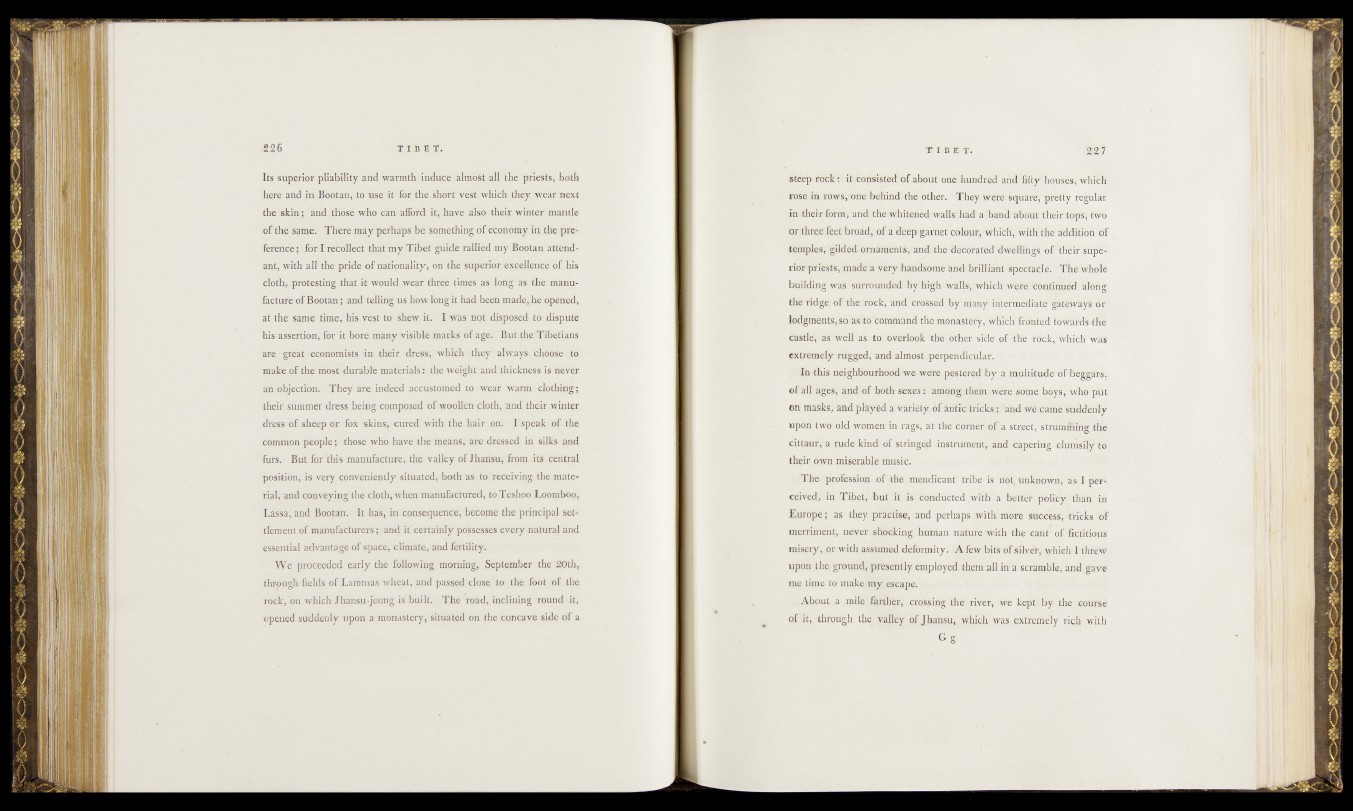
Its superior pliability anti warmth induce almost all the priests, both
here and in Bootan, to use it for the short .vest which they wear next
the skin; and those who can afford it, have also their winter mantle
of the same. There raajrptrhaps be something of economy in the preference
; for I recollect that my Tibet guide rallied my Bootan attendant,
with all the pride of nationality, on the superior excellence of his
cloth, protesting that it would wear three times as long: as the manufacture
of Bootan; and telling us how long it had been made, he opened,
at the same time, his vest to shew it. I was not disposed to dispute
his assertion, for it bore many visible marks of age. But the llbetians
are great economists in their dress, which they always chooser to
make of the most durable materials : the weight and thickness is never
an objection. They are indeed accustomed to wear warm clothing;
their summer dress being composed of woollen cloth, and their winter
dress of sheep or fox skins, cured with the hair on. I speak of the
common people; those who have the means, are dressed in silks and.
furs. But for this manufacture, the valley of Jhansu, from its central
position, is very conveniently situated, both as .to receiving the material,
and conveying the cloth, when manufactured, toTeshoo Loomboo,
Lassa, and Bootan. It has, in consequence, become the principal settlement
of manufacturers; and it certainly possesses every natural and
essential advantage of space, climate, and fertility.
We proceeded early the following morning, September the 50th,
through fields of Lammas wheat, and passed close to the foot of the
rock, on which Jhansu-jeung is built. The road, inclining round it,
'opened suddenly upon a monastery, situated on the concave side of a
steep fcfCk: it consisted of about quo hundrad' and fifty feusds, Which
rose in rows,1 one behind the other. They wefce hqhaErè,' pretty regular
in their form, Wdl’i^feuvh&ehéd walls had a band tVo
otitfar^feéribroad, of a deep garnet Colour, Wki£h,>Witft*the;&dditio0 of
temples, gMded ornaments, and the decóiHtë&totaÉlliftjgd èfPlifBtf êupé*
rior priests, made a very handsome and'briMiant ipéèt-acle. The WÜdlë
building was surrounded by high Walls,'WMidtf’wfefe Continued ^löh^
the ridge of the rock, and crossed by o jté^v aj^or"'
lodgments, so as-to command the monastery, wBÖffidnted towards the
castle, as well as to overlook the dther 'Side of thh 4dck,-which'Wag
extremely mgged, and dmostiperpetidittiiar.
In this neighbourhood we were pestered byia muhitüde'dfëbégglöll
Of alf ages, and of both sexes: among theip, were sömeteys;-wh<rput
on masks, and played a variety of antic tricks; ’and wé came Suddenly
upon two old women in Kfg£, ut the co^l'i'è^a street, strflmi$irig thé
cittaur, a rude kind of Stringed instrumerlt, and capering -clumsily to
their own miserable music*
The profession of the mendicant tribe ÏS nöt*üiiknOWtv-&'s'f peri
ceived, in Tibet," but it is conducted With -a better policy thltt. in
Europe; as' thby pricrise, andpbrhaps with more Success, tricks of
merriment, never shocking human nature with the Cant oP^titiotik
misery,'dr with assumed deformity. A few
upon the ground, ptesefttly employed’them all in’a scramble, and gave
me time to make my escape.
About a mile far|her4 crossing the river, We kept: by the éoüisé
of it, through the valley of Jhansu,, wfet^hwas ®xtE^êiy rich with
G g